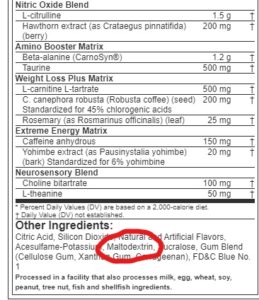
The rising popularity of fasting and intermittent fasting diets have caused some confusion about what exactly breaks a fast. As silly and obvious as it may sound, to experience all the health benefits of a fast you have to… fast. Anything of caloric value will technically break a fast, no matter how small. This is why I never understood these arbitrary numbers like ‘if you stay under 35 calories’ or ‘if you stay under 50 calories’ you’re still in a fasted state; it’s just not true.
If I’m going to fast and receive all the proposed benefits of it, I’m going to do it properly. Herbal teas, water, and some diet sodas (check your labels) have legitimately zero calories. Many people drink black coffee during a fast, but technically it does contain about two calories per eight ounce serving. You could argue that since it’s so hot it forces you to drink it slowly, and that the caloric “load” over that period of time is so insignificant that it wouldn’t affect anything.
For the purpose of this list, we are going to consider any supplement containing any amount of calories to be breaking a fast. This is designed to eliminate any confusing regarding the caloric content of supplements and also shed light on supplements that may have hidden calories.
Amino Acids (EAA or BCAA)
When you consume a food or supplement containing protein, it is broken down into individual amino acids and then rebuilt to form new proteins in the body. In fact, all macronutrients are broken down and then rebuilt. Carbohydrates break down into glucose and fructose, then they are rebuilt to form long chains of glycogen in the muscle or liver. Fats break down into individual fatty acids, then they are rebuilt to form triglycerides.
Just because you are consuming an amino acid supplement which is in a sense ‘pre-digested’, you are still triggering metabolic reactions in the body which will break a fast. Leucine, which is found in both essential amino acid and branched chain amino acid products, stimulates an insulin and mTOR response. These are not bad things by any means, they actually play a critical role in building muscle. However, the point of a fast is to keep things like insulin, blood sugar, and mTOR low.
Amino acids have caloric value. If you consume 15 grams of amino acids, you’re basically consuming 15 grams of protein. Would you eat three ounces of chicken and assume you were still in a fasted state? Of course not. The ease of digestion of the amino acids does not change its caloric load.
Pre-Workout Supplements
Many pre workout supplements contain individual amino acids like Leucine, which we just learned breaks a fast. But what you may not realize is that many also contain carbohydrates. Despite being flavored with artificial sweeteners, which contain no calories, it’s not uncommon to look on the label and see an additional two to five grams of carbohydrates in a pre workout supplement.
Some supplements do not have a traditional supplement facts panel that lists calories and carbohydrates. If you’re curious whether or not your pre-workout contains carbohydrates that aren’t explicitly listed, check under other ingredients for things like maltodextrin or dextrose. Maltodextrin is a carbohydrate derived from starch that is highly processed and used as a food additive. Even though it is technically a polysaccharide, it is digested rapidly in the small intestine similar to glucose. Since it causes this digestive reaction, it would break a fast.

Bulletproof Coffee

Not only does bulletproof coffee break a fast, it probably contains more calories than most healthy meals. Bulletproof coffee is basically coffee with added butter and MCT oil or coconut oil. Butter, MCT oil and coconut oil are extremely calorie dense sources of fat. A small amount can really pack on calories. Depending on the amount you use, you could easily be consuming upwards of 400 calories in one drink. To think that this would not break a fast is borderline insane. While bulletproof coffee is not technically a supplement, it is often consumed as part of a fasting protocol (particularly those on ketogenic diets).
Bone Broth/Collagen Protein
One of the potential benefits of fasting is its ability to improve gut health. Two supplements that complement gut health are bone broth and collagen protein. However, both are protein sources and thus contain calories which will break a fast. What’s more, unlike the amino acid supplements, these are proteins that require considerable digestion. In other words, they definitely break a fast.
But in this situation you have to look at the cost/benefit. If you’re fasting strictly to improve gut health, then you can be more lax about the rules of fasting. You may follow a protocol that involves ingesting bone broth and glutamine periodically to fix your gut. Glutamine is an amino acid and has caloric value, like we mentioned earlier in the BCAA/EAA section. But in this situation you don’t care about following all the rules, you just want to feel better.
Fish Oil
Omega-3 fish oil is a supplement with legitimate research on various health outcomes. The two main omega-3 fatty acids are eicosapentaenoic acid (EPA) and docosahexaenoic acid (DHA). They’re typically extracted from fish, hence the name, and are made into liquid or pill supplements.
In the end, fish oil is just that, an oil. Even though you don’t cook with it, it should be looked at (from a calorie perspective) the same as something like olive oil. It contains fat and will break a fast. A typical serving is 5g, which will yield 45 calories.
Final Notes
While it may seem like I’m just being a stickler in trying to expose some of the fallacies when it comes to what’s allowed while fasting, I just want to lay out all of the information. People fast for different reasons and have different goals. Earlier we alluded to the cost benefit analysis. It’s up to you to decide what is the best path to your goal if you decide to implement fasting.
If you’re looking for maximum autophagy, you should probably avoid all the things on this list as they would disrupt that process.
If you’re looking to heal your gut, it’s not a big deal if you have 60 calories of bone broth every couple of hours.
If you exercise but want to change your eating habits, having some aminos during your “fast” won’t harm you.
There is a lot of misinformation about fasting. The purpose of this article was to debunk some of the myths about digestion and metabolism and what technically is and is not allowed on a fast.
